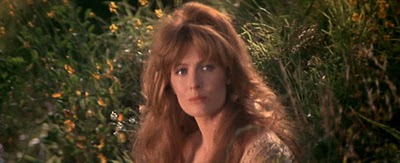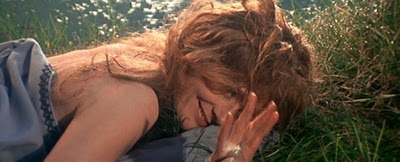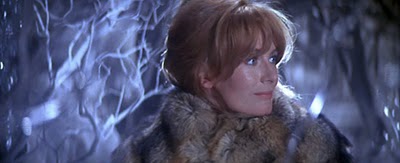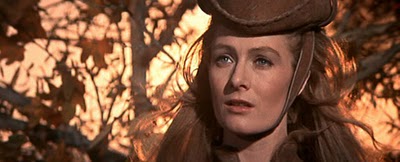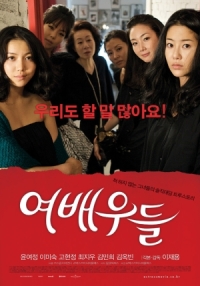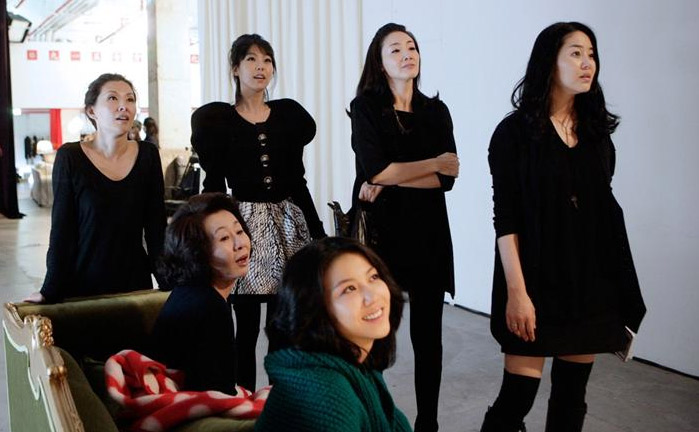 Kurt here. Whereas the NYFF title My Week with Marilyn finds it necessary to blatantly announce that “first love is such sweet despair,” French writer-director Mia Hansen-Løve's third feature, Goodbye First Love, offers the same sentiment in a kind of long whisper, stretching out its meaning over 110 minutes and eight long years. The film would be even stronger if the whisper were fainter still, and if Hansen-Løve (The Father of My Children) were a touch less eager to reach out a helping hand, but as it stands, it's an earthy, sprightly, intuitive expression of how an indelible romance can affect the shape of a life.
Kurt here. Whereas the NYFF title My Week with Marilyn finds it necessary to blatantly announce that “first love is such sweet despair,” French writer-director Mia Hansen-Løve's third feature, Goodbye First Love, offers the same sentiment in a kind of long whisper, stretching out its meaning over 110 minutes and eight long years. The film would be even stronger if the whisper were fainter still, and if Hansen-Løve (The Father of My Children) were a touch less eager to reach out a helping hand, but as it stands, it's an earthy, sprightly, intuitive expression of how an indelible romance can affect the shape of a life.
Its chief subject is Camille (Brittany Murphy lookalike Lola Créton), a shy young lass not unlike a number of girls I know, who've had to redefine themselves after leaving the man who defined them. At the start of the film, 15-year-old Camille is inseparable from Sullivan (Sebastian Urzendowsky), the boyfriend who rules her heart but, more importantly, helps her make sense to herself. Things start to rapidly unravel as the day approaches when Sullivan will leave Paris for a 10-month trek through South America, the kind of worldview-enhancing, coming-of-age adventure he wishes Camille would have on her own (he attacks her childish ignorance with married-couple tough love). But that's an unfathomable thing for the heroine at the outset, as is the thought of Sullivan leaving, which creates such fear in Camille it's almost as if she starts seeing the whole natural world around her as a threat, with wind and spiders and the buzz of insects cruelly heralding Sullivan's drift into the wilderness (much of the film, including almost all of the first act, takes place in a remote cottage surrounded by nature).

And drift Sullivan does, first physically, and then entirely, after giving up trying to communicate with a bitter and depressed Camille via snail mail (“I won't call,” he says in memorable voiceover, “because every detail hurts you, like my experiences are insults to us”). With one forcedly symbolic winter and a passing reference to Candide (“is this the best of all possible worlds?”), Hansen-Løve then shifts matters to a very sharply defined second act, wherein Camille gets a haircut, gets a new job, and goes to school. Supporting a running metaphor that yields many rewards despite (again) pushing a tad too hard, Camille studies architecture, and in her earlier classes, we see that her restrictive heartache is manifesting in her work – high-rises with tiny rooms, moat-like ponds that hinder exploration. But, of course, this also becomes Camille's outlet to rebuild herself and her life, and it opens up a world of opportunity for the director in terms of atmosphere, with Camille and her classmates visiting and examining all sorts of interesting structures.
 And yet, nature keeps creeping in amid all the man-made marvels, specifically water, as Hansen-Løve makes swimming the ultimate pastime in an effort to establish an ongoing rinse cycle. Camille moves on, begins to make a name for herself in the architectural world, and even sparks up the old cliché relationship with a teacher decades her senior (she's nearly 23 as the film winds down). But Sullivan indeed returns to the picture, with feelings that are indeed still reciprocated, only to leave again. And with the recurring scenes of swimming, Hansen-Løve implies that Camille isn't continually baptizing herself anew, she's refreshing her tender, but also toxic, devotion to her first love, the one that “lives inside her like a disease.” When we finally leave Camille, she is, once again, taking a dip in the river. And though Sullivan's hat, which she brings along for the afternoon, is knowingly swept away and taken by the current, the scene expresses one thing most of all: Rinse. Repeat.
And yet, nature keeps creeping in amid all the man-made marvels, specifically water, as Hansen-Løve makes swimming the ultimate pastime in an effort to establish an ongoing rinse cycle. Camille moves on, begins to make a name for herself in the architectural world, and even sparks up the old cliché relationship with a teacher decades her senior (she's nearly 23 as the film winds down). But Sullivan indeed returns to the picture, with feelings that are indeed still reciprocated, only to leave again. And with the recurring scenes of swimming, Hansen-Løve implies that Camille isn't continually baptizing herself anew, she's refreshing her tender, but also toxic, devotion to her first love, the one that “lives inside her like a disease.” When we finally leave Camille, she is, once again, taking a dip in the river. And though Sullivan's hat, which she brings along for the afternoon, is knowingly swept away and taken by the current, the scene expresses one thing most of all: Rinse. Repeat.
 Saturday, October 15, 2011 at 4:04PM
Saturday, October 15, 2011 at 4:04PM 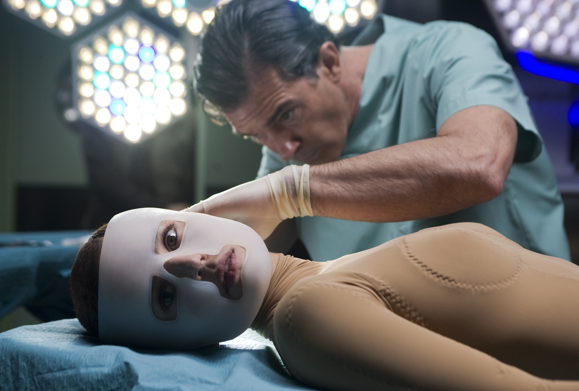 Dr. Banderas and his monster?
Dr. Banderas and his monster?


